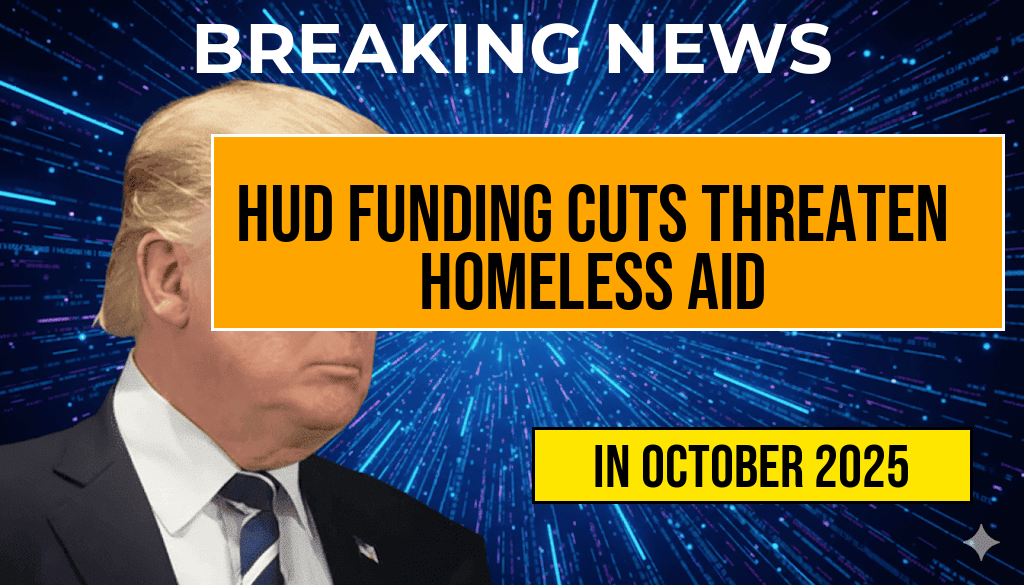The Department of Housing and Urban Development (HUD) is facing a significant reduction in funding, with appropriations slashed from approximately $3.3 billion to just $1.1 billion for the upcoming fiscal year. This dramatic decrease threatens to undermine critical programs aimed at combating homelessness across the United States. Among the most vulnerable is a $170,000 aid initiative that provides essential services to homeless individuals and families. The funding cut has prompted concern among advocacy groups, local governments, and service providers who warn that the reduction could reverse recent gains in homelessness reduction efforts and leave many without vital support during an already challenging crisis.
Funding Decline Sparks Widespread Concern Among Homelessness Advocates
Significant Budget Cuts and Their Implications
| Year | Funding Amount |
|---|---|
| Previous Year | $3.3 billion |
| Current Year | $1.1 billion |
The nearly 67% reduction in HUD’s budget represents one of the steepest cuts in recent history. While the original budget was allocated to a broad range of programs—including affordable housing, disaster recovery, and community development—the decrease primarily impacts initiatives targeting homelessness prevention and supportive services.
Sources such as the official HUD website and recent congressional budget analyses indicate that the funding decrease is driven by shifting political priorities and broader fiscal constraints. However, the immediate effect is a shrinking pool of resources dedicated to vulnerable populations, leading to fears of increased homelessness and housing instability.
The $170,000 Aid Program at Risk
Among the programs most directly affected is a targeted $170,000 assistance initiative designed to provide transitional housing and support services for homeless families in urban centers. This program offers temporary shelter, employment counseling, and mental health services, assisting individuals to regain stability and secure permanent housing.
With the funding cut, service providers warn that they may be forced to curtail or suspend operations, risking the displacement of dozens of families each month. “This program has been instrumental in reducing homelessness in our city,” said Maria Lopez, director of a local nonprofit. “Losing this funding could undo years of progress and leave many families without a safety net.”
Impact on Homelessness Trends and Local Efforts
Recent Progress Challenged by Budget Reductions
Over the past five years, federal and local initiatives have contributed to a decline in homelessness rates, according to data from the Department of Housing and Urban Development. However, experts warn that the recent funding cut threatens these gains.
“Funding stability is crucial for long-term planning,” explained Dr. James Carter, a housing policy analyst at the Urban Institute. “Reducing resources at this scale risks reversing progress and increasing the number of individuals living on the streets or in shelters.”
Local governments, which often supplement federal funds with state or private resources, may struggle to fill the gap. Many have already faced budget constraints and are unsure how to adapt to the new funding landscape.
Potential Rise in Homelessness and Strain on Shelters
Shelter operators and social workers anticipate a surge in demand for emergency housing and support services. With fewer federal funds, shelters might experience overcrowding, longer waiting times, and reduced capacity to serve those in need.
“Every dollar cut from these programs means fewer beds and less outreach,” said Kevin Mitchell, director of a homeless outreach organization in Ohio. “Without proper support, more people will end up sleeping rough, which increases health risks and societal costs.”
The Federal Housing Administration (FHA) has also expressed concern over the reduction, emphasizing the importance of sustained investment in homelessness prevention.
Broader Policy and Political Context
Debates Over Federal Housing Priorities
The funding decrease comes amid broader debates over federal housing priorities, with some policymakers advocating for reduced spending on social programs to address fiscal deficits. Critics argue that such cuts disproportionately affect vulnerable populations, exacerbating existing inequalities.
Conversely, supporters of the budget reduction suggest reallocating funds toward economic development initiatives and infrastructure projects, asserting that the overall approach will stimulate long-term growth.
According to the Wikipedia page on U.S. housing policy, federal investments have historically played a vital role in reducing homelessness, but recent budget shifts threaten to undermine these efforts.
Community and Advocacy Responses
Advocacy groups are mobilizing to pressure lawmakers for restored funding, emphasizing the human toll of these cuts. Petitions, public demonstrations, and direct engagement with representatives aim to highlight the urgency of maintaining support for homeless assistance programs.
“We need a balanced approach that prioritizes human dignity and stability,” said Angela Brooks, policy director at the National Alliance to End Homelessness. “Reducing resources now will only lead to higher costs down the line, both economically and socially.”
State and local agencies are also seeking alternative funding sources, including private grants and philanthropic contributions, to mitigate the impact of federal reductions.
Looking Ahead: Challenges and Opportunities
While the funding cut presents a formidable challenge, some experts see an opportunity to innovate and optimize existing resources. Community-led initiatives, increased collaboration among nonprofits, and leveraging technology for outreach could help bridge the gap created by federal reductions.
Nevertheless, the immediate concern remains the potential rise in homelessness levels and the strain on support systems. Policymakers, service providers, and community members must navigate these changes carefully to prevent setbacks in the fight against homelessness.
For further information on federal housing programs and homelessness statistics, visit the HUD Homelessness Assistance Page and the Statista homelessness overview.
Frequently Asked Questions
What is the main concern regarding the recent reduction in HUD funding?
The primary concern is that the decrease in HUD funding from 3.3 billion to 1.1 billion threatens to significantly reduce resources available for addressing homelessness, potentially leaving many vulnerable individuals without essential support.
How will the funding decrease impact the $170,000 aid program?
The reduction in funding jeopardizes the $170,000 aid program, which is designed to provide critical assistance to homeless populations. This may result in diminished services or the program being discontinued altogether.
What are the potential consequences of decreased HUD funding on homelessness?
Lower HUD funding could lead to increased homelessness, reduced access to shelter and support services, and a strain on local communities trying to manage the crisis with fewer resources.
Are there any proposed solutions or actions to address the funding shortfall?
Stakeholders are calling for increased federal support and alternative funding sources to bridge the gap, ensuring that homelessness aid programs can continue to operate effectively.
Who is affected by the funding reduction and what communities are at risk?
Individuals experiencing homelessness across various communities are at risk, especially those relying on HUD-supported services. Vulnerable populations in urban and rural areas could face worsened conditions due to the funding cutback.






